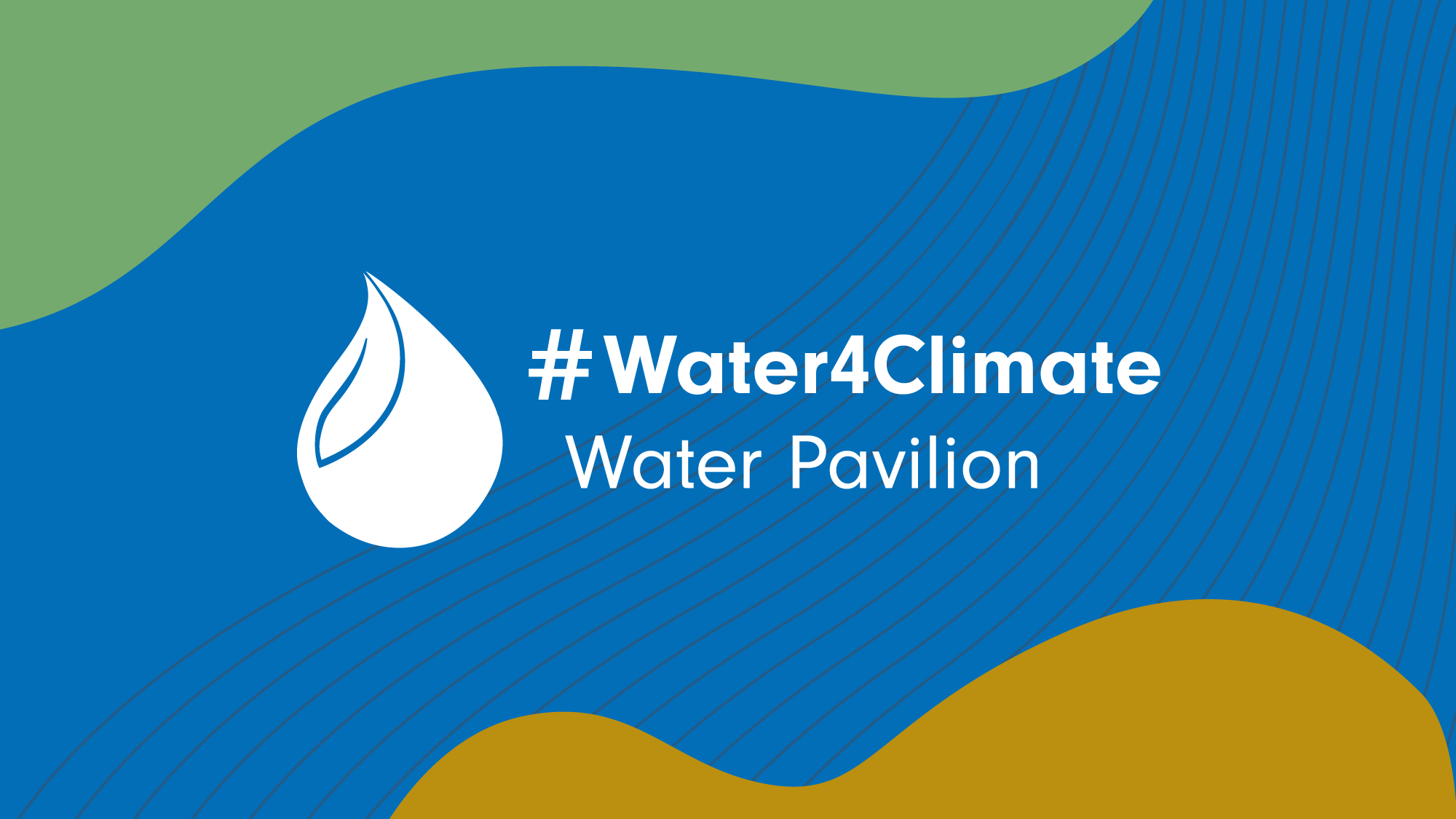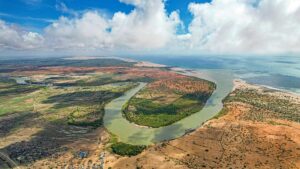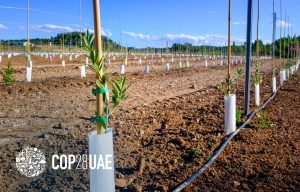heading
Water can be a powerful tool in climate action. To share new knowledge about water and climate, SIWI will be taking active part in the global climate conference COP27 between 6 and 18 November. Join our programme online to learn about a promising new generation of climate solutions.
The United Nations Climate Change Conference took place in Sharm El-Sheikh, Egypt, 6-18 November 2022
SIWI has attended climate COPs since 2009 and this year Executive Director Torgny Holmgren led a delegation with members of our International Policy team as well as topic experts. More colleagues supported online.
Many activities took place in the Water Pavilion of COP27 and were livestreamed via the Water Pavilion website. SIWI also organized and participated in other events. See more details below.

Previous COPs
Programme highlights
New landmark report on the role of water in climate mitigation
On 9 November, SIWI and four other organizations will present a much-anticipated report summarizing current research on the role of water in climate mitigation. This is the first overview of its kind, and it shows that water is much more important in climate mitigation than previously believed, which should make many governments rethink their current strategies.
Preparation for the UN Water Conference
On 12 November, SIWI is the co-organizer of the event Accelerating action on water and adaptation together with the governments of the Netherlands and Tajikistan to highlight how countries can work more effectively with climate adaption. The United Nations 2023 Water Conference, co-chaired by these two governments, will be a major focus of this event.
Water Day
Monday 14 November is the official Water Day at COP27. SIWI is involved in the organization of the side event Water Action Day to demonstrate impactful solutions that should be replicated and scaled up. The event is co-organized together with the High-Level Climate Champions and the International Water management institute (IWMI).
The role of forests, source-to-sea management, and WASH services
Join SIWI’s experts as they will be sharing knowledge about practical climate solutions in several sessions. See below for more information.
SIWI’s sessions
Join SIWI’s experts as we will be sharing knowledge about practical climate solutions in several sessions.
9 Nov | Freshwater’s role in climate change mitigation, at the Water Pavilion
Co-led with: GIZ, Xylem
11 Nov | The Ocean, its ecosystems, and the UNFCCC: what actions now for effective Ecosystem based Adaptation (EbA), at the Ocean Pavilion
12 Nov | Building resilience from the bottom up: science-based tools for adaptation, at the Water Pavilion
Co-led with: Pacific Institute, AGWA, UNESCO-IHP, Forest-Water Champions, Center for Climate and Resilience Research
12 Nov | Accelerating action on water and adaptation, UNFCCC Side-event
Co-led with: the government of the Netherlands, the government of Tajikistan
12 Nov | Steering the green transition in farming and food, at the Danish Pavilion
14 Nov | Water Action Day, Marrakech Partnership for Global Climate Action, location TBC
Co-led with: WRI, High-Level climate champions
14 Nov | The power of water: reaching climate security through water by cross-sectoral, inclusive and ambitious action, MPGCA Climate Action event
15 Nov | High-Level Source to Sea Session, at the Water Pavilion
15 Nov | Enhancing Food and Water Security in the Arab States: Challenges & Opportunities, location TBC
18 Nov | Resolution Day, at the Water Pavilion
Co-led with: MWRA, FAO
Water offers powerful climate solutions
At COP27, SIWI will be presenting new insights and good examples of how countries have improved the management of water to make their climate strategies more effective and resilient. Many of these solutions reduce greenhouse gas emissions whilst strengthening the resilience of people and ecosystems.
Water is a make-or-break factor in climate action
On 9 November, SIWI will present a new report on the role of water in climate mitigation, co-written with the Potsdam Institute on Climate Impact Research, the Stockholm Resilience Centre, the German development agency GIZ on behalf of BMZ, and UNDP.
The report shows that water has a much greater role in climate mitigation than previously assumed. By improving how water is managed, countries can find effective solutions that reduce greenhouse gas emissions whilst strengthening the resilience of people and ecosystems.
As described in the most recent report from the Intergovernmental Panel on Climate Change, the water cycle has turned out to be more sensitive to global warming than scientists predicted. This means that we already now, after a 1-degree temperature rise, experience droughts and floods of a magnitude not expected to occur unless the planet got significantly hotter. For decision-makers, this means that they need to prepare for a much more uncertain and challenging future, where it will be increasingly difficult to grow food, produce energy, construct buildings, and maintain infrastructure. It will require a new kind of thinking since many of today’s solutions may no longer be feasible if there is less water available or if disasters keep recurring.
Water therefore needs to be at the heart of planning so that for future food production and energy systems work even if floods and dry spells become much more common. Decision-makers need to understand emerging water risks and factor in the impact different plans would have on water resources since uninformed choices could escalate the climate, food, energy, and water crises.
Work with nature for more effective climate policies
The rapid degradation of nature causes loss of biodiversity and increases global warming. It is also a major driver of poverty since it triggers crop failure and makes people more vulnerable to floods, droughts, and other impacts of climate change. Nature-based solutions can play an important role to reverse these trends. There are many powerful water-related climate solutions that work with nature to provide multiple benefits, including poverty reduction, greenhouse gas sequestration, and protection from the impacts of global warming.
Invest in rainfed agriculture to strengthen the resilience of smallholder farmers
The climate crisis is one of main drivers of the current rise in hunger in many parts of the world, but the situation can be greatly improved through greater investments in improved management of water. This is especially true in Sub-Saharan Africa where most smallholders rely on rainfed agriculture. Relatively modest levels of investments would make it possible for smallholder farmers to strengthen their water management and become more resilient to dry spells and other extreme weather events.
Climate-proof water and sanitation services
One of the best ways to improve people’s resilience to climate shocks is to ensure that everyone has access to safe water and sanitation. Countries need to do more to ensure that water, sanitation, and hygiene (WASH) services are adapted to withstand stress caused by extreme weather events and other climate shocks. Improving access to WASH in schools, health care facilities, institutions, and different public spaces will increase the quality of education and health care and is especially important for disadvantaged groups.
Manage water holistically from source-to-sea
Climate risks and the degradation of nature are two of the most important drivers of poverty, but the situation can be alleviated through improved management of terrestrial, freshwater, coastal, and marine systems. Done right, this will restore healthy ecosystems, and foster collaboration both upstream-downstream and across sectors, with great benefits for the environment, economy, and local communities. Source-to-sea management can help us address many of society’s greatest water-related challenges, including climate change, water, and food insecurity, marine pollution, and the degradation of nature. National governments must incentivize and implement this kind of holistic source-to-sea management.

Welcome to the Water Pavilion
Water has a pivotal role to play in climate action and the best way to learn about this is to visit the Water Pavilion of COP27 which is available online, for everyone. The Water Pavilion is held in the Blue Zone of COP27 to deliver cutting-edge, science-based advice to climate decision-makers and negotiators. It brings together more than 30 different organizations committed to raising awareness of the role of water for climate and is led by the Government of Egypt with SIWI as an implementing partner. Throughout the COP, the Pavilion will host a series of sessions on different topics which can be followed online through the Water Pavilion’s website, soon to be launched, and SIWI’s YouTube channel.
Visit the Water Pavilion websiteMeet our team
Our experts on-site
Contact our team on-site or online to learn more about the role of water in climate action and how SIWI can support important transitions. Our experts are happy to take on interviews and speaking opportunities.











